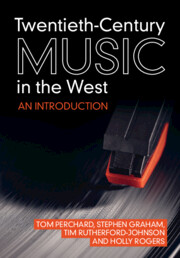Book contents
- Twentieth-Century Music in the West
- Twentieth-Century Music in the West
- Copyright page
- Contents
- Figures
- Tables
- Acknowledgements
- Introduction
- Part I Histories
- 1 Place and Space, Local and Global
- 2 Modernism
- 3 Postmodernism
- 4 Canons
- Part II Techniques and Technologies
- Part III Mediation
- Part IV Identities
- Bibliography
- Index
3 - Postmodernism
from Part I - Histories
Published online by Cambridge University Press: 15 September 2022
- Twentieth-Century Music in the West
- Twentieth-Century Music in the West
- Copyright page
- Contents
- Figures
- Tables
- Acknowledgements
- Introduction
- Part I Histories
- 1 Place and Space, Local and Global
- 2 Modernism
- 3 Postmodernism
- 4 Canons
- Part II Techniques and Technologies
- Part III Mediation
- Part IV Identities
- Bibliography
- Index
Summary
The prerogatives of the new, of progress and the future, had been more important than ever in the wake of World War II. But, by the 1970s, the grand schemes that had characterised Western modernity and modernism seemed all to be failing. This was true on the broadest scale: while Nazi genocide was in the past, the Soviet experiment that had given much early modernist art its force – and postwar Western social democratic reforms their urgency – was now crumbling in totalitarian misery. It was true of people’s lived experience: rather than ushering in a life in the sky, new high-rise housing had further ripped at an already tattered social fabric. And it was true of the arts: as much as unveiling a new lingua franca for an international modern music, serial composition had seemed to renounce its own audience, and listeners now turned to popular musics even for the experiment and challenge that art music had once vaunted. Here was the crisis: a loss of intellectual and spiritual confidence in the West’s ability – taken as read since the Enlightenment – to envisage and work towards a better future by way of rational means (Berman 1982).
- Type
- Chapter
- Information
- Twentieth-Century Music in the WestAn Introduction, pp. 77 - 103Publisher: Cambridge University PressPrint publication year: 2022



